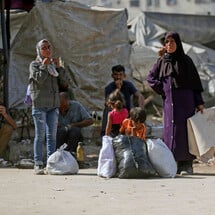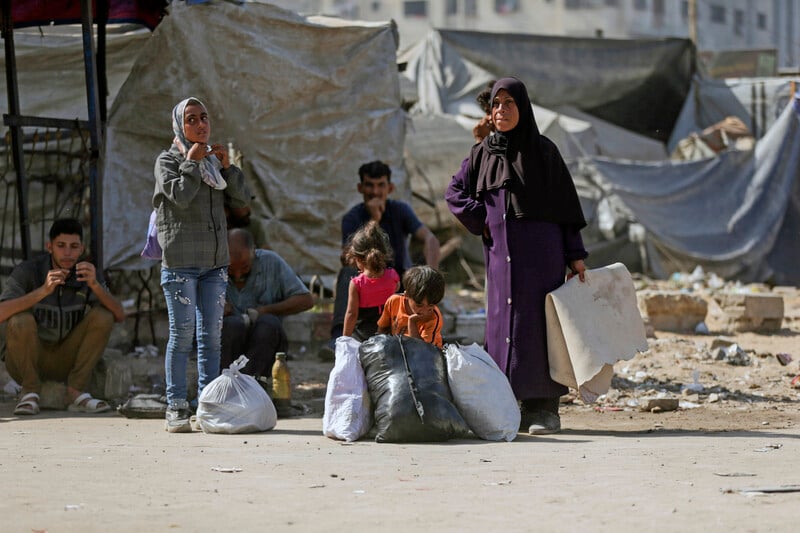
The Palestinian resistance “didn’t surrender” and “didn’t agree to disarmament or demilitarization,” said Jeremy Scahill on The Electronic Intifada Livestream for 9 October.
“A nuclear-armed serial killer masquerading as a nation state, with the full backing of the United States, has failed to impose a surrender on Palestinians wearing Adidas flip flops, tracksuits, and operating with largely domestically manufactured weapons,” Scahill, co-founder of Drop Site News, added.
Throughout the ceasefire negotiations, Scahill has reported based on discussions with Hamas negotiators and other resistance sources.
As a result of the agreement announced on Wednesday by US President Donald Trump, 600 daily aid trucks are supposed to start moving into Gaza, distributed by the United Nations – not the Israeli-American Gaza Humanitarian Foundation.
As the deal went into effect over the weekend, Israeli military forces withdrew to a line inside Gaza, allowing tens of thousands of displaced Palestinians to start returning to their albeit devastated homes in the north.
The Palestinian resistance “didn’t surrender,” says @JeremyScahill.
“They also didn’t agree to disarmament or demilitarization.” pic.twitter.com/3DB8kryjxM
— Electronic Intifada (@intifada) October 9, 2025
In coming days, Palestinian resistance fighters are set to release all the Israeli prisoners of war still in their custody in Gaza – often erroneously referred to as hostages.
Israel has committed to release some 2,000 Palestinian prisoners, including 250 with long-term sentences.
The agreement covers only phase one of Trump’s 20-point so-called “peace plan,”.
However, the end of widespread Israeli bombardment that was killing dozens of people each day has brought relief and joy to Palestinians – as associate editor Nora Barrows-Friedman covered in her news report at the start of the program.
Scahill previously appeared on The Electronic Intifada Livestream in May to talk about the ceasefire tricks the US and Israel had been playing with Hamas.
What deceptions might Trump and Israeli Prime Minister Netanyahu be pulling now? And if this really is the end of the two-year long genocide – which Hamas leaders say they have been given assurances it is – then what made that possible?
These are some of the questions tackled by Scahill and the editors throughout the show.
Executive director Ali Abunimah and Scahill both emphasized the continued need for global solidarity with Palestine, even if this ceasefire deal moves forward.
“It’s more important now than ever for people to remain vigilant. Because all of these crimes have been exposed. Because the momentum is there,” said Scahill. “It’s not over. In many ways, it’s just beginning.”
Regular Electronic Intifada contributor Donya Abu Sitta, spoke from Gaza about her hopes for life after the genocide.
Contributing editor Jon Elmer reported that the Israeli military established a base inside a school in Gaza City.
Resistance fighters infiltrated it, mounted a 70-ton Merkava tank and hand-delivered a bomb that injured 11 Israeli soldiers.
He said that action may be the last of the genocide if the ceasefire holds.
“Right up to these ceasefire negotiations, the resistance is carrying out command and control operations that show they’re functioning as a military fighting force,” Elmer said.
Even with all of their American-supplied weaponry, the Israelis “are still unable to secure those areas,” Elmer noted.
What changed?
What changed to cause Trump to commit, not just to a ceasefire but to an end of the genocide – which he calls a war?
One factor may be shifts in the president’s base, according to Scahill.
“Very prominent people that played a role in Trump’s rise [are now] taking very strong stands against Israel,” Scahill observed.
Tucker Carlson, Candace Owens and US Representative Marjorie Taylor Greene are some of the pro-Trump right-wingers now passionately criticizing Israel.
Whatever their motivations, they may have influenced Trump.
The president is also “obsessed with the fact that [President] Barack Obama got the Nobel Peace Prize,” according to Scahill.
“These are insane things to even be talking about as motivations for a head of state of the United States. But they’re real,” he said.
According to Abunimah, Israel’s weakness has to be considered a major factor.
Its army, economy and international reputation shattered, Israel has achieved none of its goals through war, including getting all its captives back, destroying and disarming Hamas and other resistance groups and depopulating and resettling Gaza.
Two years into the genocide, Abunimah noted, Israel is still forced to negotiate with Hamas.
Scahill pointed to recent comments by Trump indicating that this may be the case.
“He himself said the other day that he sees it as: Netanyahu has driven Israel into the ground and Trump is giving them a lifeline, a lifeboat,” Scahill said. “Part of it is that they realize Israel is not winning this war in military terms.”
Trump told Fox News on 8 October that he had spoken to Netanyahu.
“I said, ‘Israel cannot fight the world, Bibi.’ They can’t fight the world.’ And he understands that very well,” Trump said.
A huge gamble for Palestinians
Meanwhile, the Palestinian resistance – led by Hamas – had its own reasons to accept the deal, Scahill explained, first and foremost to ease the immense suffering of Palestinians in Gaza.
Hamas negotiators told Trump’s team that they wanted to accept some of the president’s proposals – ending the war, exchanging prisoners, and allowing aid into Gaza – but that they would have to defer to the will of the Palestinian people on aspects of Trump’s proposal.
That includes Trump’s plan to have Gaza ruled by Tony Blair, the former British prime minister.
Hamas emphasized to Trump that decisions over sovereign rights of the Palestinian people can only be made by all their representatives in an inclusive process. No group can take such decisions alone.
“Shockingly, to some Palestinian negotiators, Trump responds to this and says: Great news. Hamas has responded positively and it seems like they want peace and we can make a deal,” reported Scahill.
Palestinian negotiators also told Scahill there was “immense pressure” from Egypt and Turkey to reach an agreement.
When Trump says the agreement will end the war does that mean it will still allow Israel to occasionally bomb Gaza and carry out massacres – a practice Israel calls “mowing the lawn?”
And like the ceasefire agreement with Lebanon, will Israel regularly violate it with impunity?
“Probably it means that for now,” said Scahill.
Palestinian negotiators also acknowledged it was a huge gamble to release the Israeli prisoners of war.
Dr. Muhammad al-Hindi, the lead negotiator for Palestinian Islamic Jihad, acknowledged that this would mean giving up leverage.
But he emphasized that if Israel violates the agreement, resistance fighters will still have their weapons and their steadfastness.
Collaborator gangs
Editors also discussed a map published by Al Jazeera purportedly showing that Israel will still control 58 percent of Gaza – at least during the first phase of the ceasefire deal.
“I don’t think any of us felt very good about what this all looks like. I think we all feel extremely well about the fact that this is going to lead to a surge in aid for people who are desperately in need of that,” said Elmer.
Associate editor Asa Winstanley brought up a recent article from London-based newspaper Alquds Alarabi about the collaborator gangs led by Yasser Abu Shabab, which Israel has recruited in Gaza to sow chaos and fight Hamas.
Citing Israeli reports, the newspaper claims Israeli officials disagree about whether to protect the collaborators in case of an Israeli withdrawal. Shin Bet, Israel’s secret police, wants to withdraw them to a safe area, but the military is reportedly ready to abandon them.
Some members of the gang have apparently also taken up a Hamas offer of amnesty.
“So if this report is accurate, then it shows that this phased withdrawal is – seems to be – a realistic possibility,” Winstanley said.
Elmer emphasized Netanyahu’s need to win support for the deal at home.
Netanyahu’s “only shot – thin shot – at victory” will be selling his base on the idea that he got the captives back and that Israeli forces are still in Gaza during this first phase of the ceasefire deal, explained Elmer.
Abunimah emphasized that if the report in Alquds Alarabi is true, it shows once again what happens to those who turn on their own people in order to help Israel.
“It’s always the fate of collaborators that those you serve – they will throw you away when they’re done with you,” Abunimah said.
Planning for after the genocide
Hours before the ceasefire deal was announced on Wednesday, Barrows-Friedman and Abunimah spoke with Donya Abu Sitta.
“People are starting to think about what will happen after this genocide,” she said in the interview, broadcast on the Livestream.
Abu Sitta, a teacher, focused on helping Gaza’s children recover.
“We will start to let them see how life looks like if there’s no genocide,” she said.
She is already thinking about the school she will rebuild, including, “What color we will paint it and which type of tables, desks and games we will bring to it.”
Abu Sitta shared a message to activists around the world who are supporting Palestine.
“I want to say, this is from all of us in Gaza: We see you and we hear your voices in the street, in marches. And we feel your love,” Abu Sitta said. “Thank you for standing with us.”
“We will still believe – Palestine will be free from the river to the sea,” she added.
You can watch the program on YouTube, Rumble or Twitter/X, or you can listen to it on your preferred podcast platform.
Tamara Nassar produced and directed the program. Michael F. Brown contributed pre-production assistance and this writer contributed post-production assistance.
Past episodes of The Electronic Intifada Livestream can be viewed on our YouTube channel.

